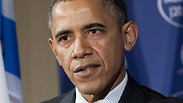
In a far-ranging interview with the New Yorker's editor David Remnick published Sunday, Obama expressed doubts about that and his other two major US initiatives in the Middle East – concerning the Iranian nuclear program and the Syrian civil war. According to Remnick, Obama believes that the probability of reaching an agreement on all three is less than 50 percent.
Related stories:
- Ya'alon: Kerry should win his Nobel and leave us alone
- Ya'alon: I supported Oslo, but I sobered up
- Defense Minister Ya'alon blames PA for escalation
“In all three circumstances we may be able to push the boulder partway up the hill and maybe stabilize it so it doesn’t roll back on us," Obama said, referring to the current turbulence in the region. "And all three are connected. I do believe that the region is going through rapid change and inexorable change. Some of it is demographics; some of it is technology; some of it is economics. And the old order, the old equilibrium, is no longer tenable. The question then becomes, What’s next?”
Obama's pessimism about the peace process seems warranted as the dust settles from the latest hitch in the relationship between Israel and the US. Last week, Yedioth Ahronoth revealed Defense Minister Moshe Ya'alon had called US Secretary of State John Kerry "messianic" and "obsessive" about his determination to reach a deal between Israel and the Palestinians.
When it comes to Israel, Obama says that the Jewish state has much in common with the Sunni Arab nations, who are also concerned by Iran's nuclear aspirations and the threat of the Shiite militant groups such as Hezbollah in Lebanon, a key supporter of both Iran and the embattled Syrian leader, Bashar Assad, whose country is now in its third year of civil war. But, warns the president, there are at least as many things dividing Israel from these potential allies, and not just the conflict with the Palestinians.
“With respect to Israel, the interests of Israel in stability and security are actually very closely aligned with the interests of the Sunni states," he told Remnick. "What’s preventing them from entering into even an informal alliance with at least normalized diplomatic relations is not that their interests are profoundly in conflict but the Palestinian issue, as well as a long history of anti-Semitism that’s developed over the course of decades there, and anti-Arab sentiment that’s increased inside of Israel based on seeing buses being blown up."
Iran has been a central tenet of the president's foreign policy, and his drive for tough sanctions on the Islamic state seemed to have paid off with Tehran now agreeing to a new deal on its nuclear program. But the deal could now be under threat, thanks to a bill proposal from his own country's lawmakers, which flies in the face of his carefully constructed plan for handling Iran.
Instead of loosening sanctions as a sweetner for Iran to abide by the agreement reach last year, Congress may well vote to impose tighter restrictions on the country. And on this issue he makes a connection to Prime Minister Benjamin Netanyahu's well-known skepticism about the negotiations with Iran.
“Historically, there is hostility and suspicion toward Iran, not just among members of Congress but the American people... members of Congress are very attentive to what Israel says on its security issues,” Obama told Remnick. He was firm however, that such a move would not be allowed to derail the progress he feels he has made on the issue. “I don’t think a new sanctions bill will reach my desk during this period, but, if it did, I would veto it and expect it to be sustained.”
Obama, Remnick writes, experienced his "lowest moments in the Middle East" when trying to tackle the war-torn Syria, whose internecine conflict is now in its third year, with at least 100,000 believed dead and hundreds of thousands of Syrians living as refugees in neighboring states.
Here too, the president is pictured as pragmatic on the chances of successfully negotiating an end to the fighting, but has no regrets not following through on his threat to take military action the Syrian regime over its alleged use of chemical weapons against its own civilian population. An eleventh hour solution apparently inspired by a throw-away remark from John Kerry led to the Syrian government agreeing to hand over its chemical weapon stockpiles to foreign powers. He is also steadfast about his caution over allowing the US to become embroiled in another war in the region.
 |
“I am not haunted by my decision not to engage in another Middle Eastern war," Obama told Remnick.
"It is very difficult to imagine a scenario in which our involvement in Syria would have led to a better outcome, short of us being willing to undertake an effort in size and scope similar to what we did in Iraq. And when I hear people suggesting that somehow if we had just financed and armed the opposition earlier, that somehow Assad would be gone by now and we’d have a peaceful transition, it’s magical thinking."















